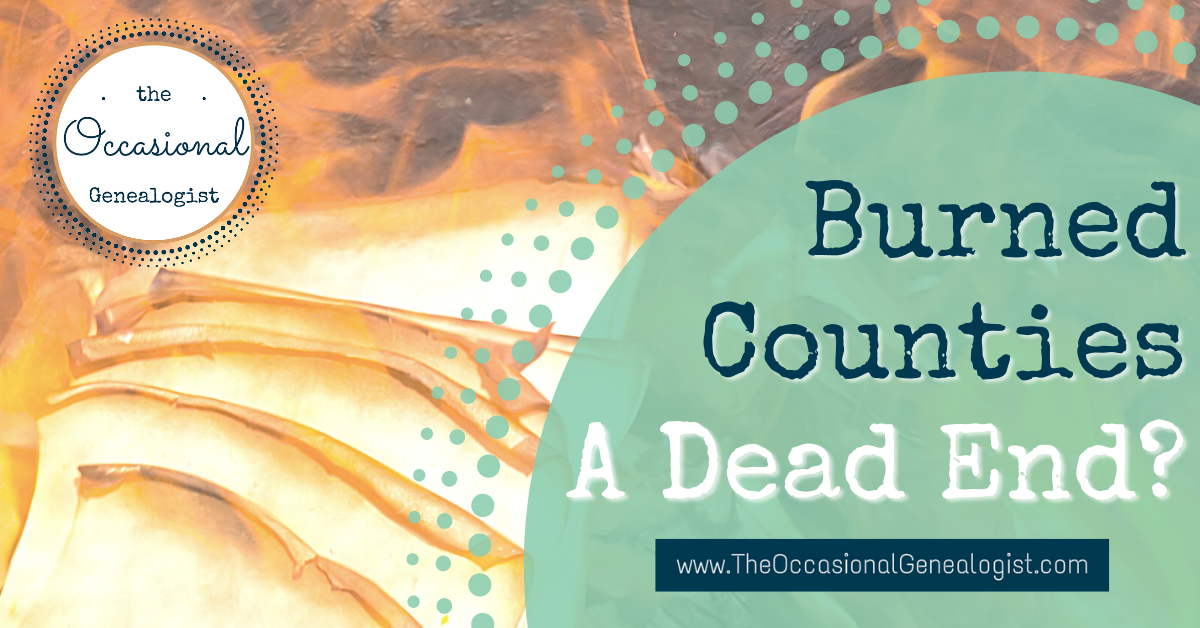
Does a burned county mean an automatic dead end in your research?
Should you just turn around and go home?
No, if you want to complete your journey, you have to treat a burned county like a literal dead end street. Go back and try a different way!
UpFront with NGS has an interesting post today about the return of some VERY early Charles City County, Virginia records. You can read the post, here.
A "burned" county is the term generically applied when civil records are lost, often to a courthouse fire. However, in the post I've linked to above, the record loss was from records stolen by Union Civil War soldiers. In this case, the records have finally been returned.
Records that burned obviously can't be restored. However, often there was an attempt to recreate lost records, particularly deeds.
Did you notice I've just described three different scenarios for a "burned county?"
- A non-fire record loss (in the Charles City County example, the records were recovered after 150 years)
- an actual fire destroying records
- a loss with recreated records
A "burned county" is not the end of the road.
If you aren't aware that there are such things as "burned counties" or if you think that's the end of the road, you need to learn more. Every genealogist has to deal with this. There are techniques to overcome record loss. A quick free source is the FamilySearch Wiki page about "Burned Counties Research."
"Burned county" is a generic term. It could have been a flood or tornado, or an unknown "loss." A courthouse fire can be a complete loss or just a bit of charring. It's also an excuse by lazy clerks and turns into urban legend.
This one post can't teach you all the techniques to overcome a "burned county. Today I want to start with the first step to overcoming a burned county, a step you should do before you even know it IS a burned county.
Before you start researching a new location, research the location. This is more than just a survey of what records exist or are convenient to obtain. Learn about what should have been created, what survives, and where the records are held, today. Check "how-to" information, old and new, about the location you are going to work in. Sometimes the court clerk is a fount of knowledge. Sometimes he (or she) is just keeping a chair warm and doing the minimum. Sometimes the clerk is very well meaning but was misinformed by a predecessor. Take the responsibility to learn about using civil records in that jurisdiction. Don't rely on the courthouse staff as your primary source of information (but do use them as they are potentially a first-hand source for what is in the courthouse).
At the very minimum, you need to determine if the records are even in the courthouse. Some locations have moved old records to storage locally or to a state facility. Don't make assumptions. If the location is quite convenient, you could start with a visit and see what happens. It can be nice to know the courthouse is easy to use and the staff is friendly and helpful. If it's the opposite, making a "reconnaissance" is nice because you don't waste major research time and you did achieve your goal (learning about researching on-site in that location).
If the location isn't convenient for you, don't make a trip unless you're fully prepared. Are the records you need in that location? Are they open to the public? Is the facility open when you're visiting? These are basic questions for any research trip. Toss in learning about burned counties by determining if there was record loss and how. Fireproof vaults work. A courthouse can be badly burned, and most records survive.
You need to be prepared to deal with a clerk that is trying to get rid of you (or is just misinformed). Know what should be in the courthouse (or repository) and what you have a legal right to see. I have colleagues that travel with a printed copy of the state statute granting the public the right to see certain records they are often told they can't see for privacy reasons. There are cases when you do not have a legal right to see records. Know the difference!
Finally, learn about some basic genealogy etiquette when visiting a courthouse. Often when clerks are difficult to deal with, it is because they've had a bad experience with a rude and pushy genealogist. Don't add to the problem! Be prepared (with knowledge) for a worst case but walk in expecting a pleasant, professional experience. You can learn etiquette "techniques" by Googling for information about doing courthouse research. Some of the techniques are not needed if you will be using a library or archive because the staff will be used to dealing with genealogists. However, you should still be polite. Always be polite.
A "burned county" might be a temporary dead end. Go back and try a different route. Start by knowing what was created, what was destroyed, and where more records are located.
Do you have a suggestion for researching in courthouses? Leave a comment below.









